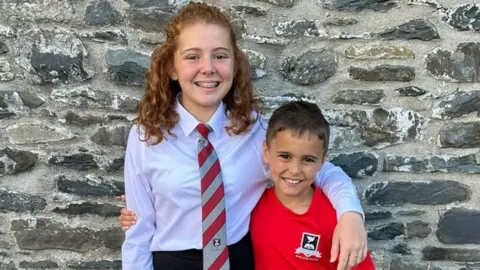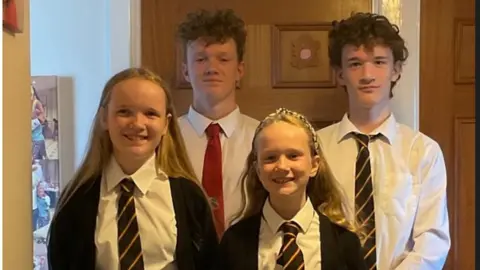Ceredigion schools' sixth forms could shut in new plan
 Family photo
Family photoAll sixth forms in a rural Welsh county could be closed under plans being considered to shake-up education.
Six Ceredigion schools could lose their sixth forms and one or two established as part of two ideas on the table.
Parent Ffion Medi Lewis-Hughes said the rural nature of the county meant centralising sixth forms would be "problematic" for pupils.
Councillor Elizabeth Evans, who studied the plans, said post-16 education "has to be delivered differently".
As part of a report into post-16 education, two options have been considered for further feasibility studies.
The first is continuing with six sixth forms, with a strategic board managing the post-16 budget and joint planning of the curriculum.
A second option is shutting them all to replace them with a "centre of excellence" at one or more sites - in this instance, a new governing body would look after funding and the curriculum.
The sixth forms that could face the axe are at:
- Ysgol Gyfun Aberaeron
- Ysgol Bro Pedr, Lampeter
- Penglais School, Aberystwyth
- Ysgol Gyfun Penweddig, Aberystwyth
- Ysgol Bro Teifi, Llandysul
- Ysgol Uwchradd Aberteifi, Cardigan
Ceredigion council claims that Welsh government funding is "not sufficient" to maintain the status quo and said the average number of pupils on post-16 courses was fewer than 12 in five out of six schools.
The number of Year 12 learners in Ceredigion's sixth forms has fallen from 535 in 2014-15 to 390 in 2020-21, with the council estimating the cost of running the courses in 2023-24 as almost £4.2m - about £400,000 more than the Welsh government grant.
 Family photo
Family photoParents across the county have voiced concerns about the plans.
Ysgol Bro Teifi in Llandysul was the first purpose-built Welsh medium school for three to 19-year-olds.
Iestyn ap Dafydd's four children - Gwenllian,12, Ioan, 16, Elliw, 10, and Emrys, 14, - go there and he said it "would be a huge, huge loss to Bro Teifi" and feels it would affect the standards of education.
Ms Lewis-Hughes has two children, Anni Grug who is in Year 7 and Gwion Jac in Year 4, at Ysgol Henry Richard in Tregaron.
That school has already lost its sixth form, but she is concerned about the latest proposals, saying: "Ceredigion is quite a rural county and with the buses and all that, it's going to be quite problematic, I would imagine.
"If there's one centre, where is it going to be? How far will they have to travel for their education? Are they actually going to save any money doing this?"Morfudd Pugh has four daughters - Cari, 12, Jeno, seven, Leila, five, and Meia, four - at Ysgol Henry Richard and has concerns about what it could mean for the Welsh language.
 Family photo
Family photo"Our family is fluent in Welsh. The school they are currently at, everything is done through the medium of Welsh and it will be even more difficult for them to settle if the campus is further afield," she said.
Liberal Democrat councillor for Aberaeron and Aberarth Ms Evans, who sits on the learning communities overview and scrutiny committee, said the county's young population was dwindling, so "we have to look at delivering a service very differently, but as effectively as it is now".After refusing interview requests from BBC Wales for the council leader, a cabinet member or the chief executive, the council said in a statement that the recommendations of the scrutiny committee would be discussed by its cabinet on 7 November.

Plans to close school sixth forms have been controversial in other parts of Wales in the past.
Back in 2015, hundreds of people protested against closures in neighbouring Pembrokeshire.
Blaenau Gwent and Merthyr Tydfil haven't had any school sixth forms for a decade and in some parts of Wales, further education colleges provide most post-16 education.
Across Wales there were 198 maintained schools with sixth forms in January 2013, and 167 in January 2023.
There are powerful financial arguments in favour of centralising resources and providing more choice for pupils in fewer centres.
But there is a strong case on the other side based on protecting the character of a school, the potential impact on recruiting teachers and, in areas like Ceredigion, on travel times for pupils and the impact on the Welsh language.
The experience of other parts of Wales suggests that balancing all these different considerations is never easy.
